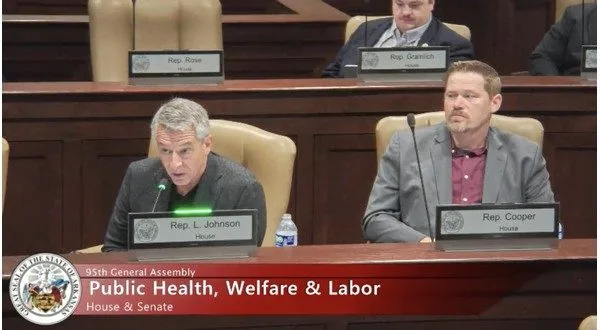
Rep. Lee Johnson (left), R-Greenwood, an emergency medicine physician and the Joint Public Health, Welfare and Labor Committee’s House chair, asks Department of Human Services officials a question about presumptive Medicaid eligibility for pregnant women on Wednesday, June 4, 2025. At right is Rep. Cameron Cooper, R-Romance. (Screenshot/Arkansas Legislature)
Arkansas lawmakers reviewed two rules Wednesday in response to a new law aimed at improving the state’s maternal health care landscape for low-income pregnant women.
The Joint Public Health, Welfare and Labor Committee spent nearly an hour discussing Arkansas’ new policy of presumptive Medicaid eligibility for pregnant women, part of the Healthy Moms, Healthy Babies Act that will go into effect in August.
Presumptive eligibility assumes 60 days of Medicaid eligibility and shortens the process of applying for coverage. The policy was among several recommendations to improve the state’s maternal health care landscape that a task force convened by Gov. Sarah Huckabee Sanders issued in September 2024.
More than half of births in Arkansas are covered by Medicaid, the federal-state health insurance system for low-income Americans. A federal budget bill moving through Congress would make deep cuts to Medicaid spending, reducing the program by $625 billion over 10 years.
Elizabeth Pitman, director of the Division of Medical Services for Arkansas Medicaid, said she anticipates the proposed cuts will affect the state’s Medicaid expansion population but not pregnant women on Medicaid.
Arkansas has among the nation’s highest maternal mortality and infant mortality rates. Rep. Jack Ladyman, R-Jonesboro, said he found this frustrating and considered presumptive Medicaid eligibility “a very good cornerstone” for improving these statistics.
Ladyman and Rep. Lee Johnson, R-Greenwood, asked Pitman and other Department of Human Services officials how they plan to ensure that pregnant Arkansans statewide have the information and resources they need to opt into presumptive Medicaid eligibility if applicable.
“I want to support this rule, but I also want to be realistic in what we expect the outcome of this rule to be,” said Johnson, an emergency medicine physician and the joint committee’s House chair. “If we pass this eligibility category and nobody’s applying for it any more often than they’re currently applying for Medicaid, then it’s not moving the needle.”
Pitman said DHS can address Johnson’s concerns about access to information in its focus groups with pregnant Arkansans. She also said the agency will work with community health workers, doulas and other local health care providers and community organizations to ensure the option of presumptive Medicaid eligibility is as widely known as possible.
DHS learned during the three-year public health emergency of the COVID-19 pandemic that spreading information about public health resources via social media, digital billboards and doctor’s offices successfully reaches the agency’s target audience, state Medicaid Director Janet Mann said.
In January, Arkansas received a 10-year, $17 million federal grant aimed at improving maternal health outcomes for Medicaid recipients. Applying for the grant was among the maternal health task force’s recommendations last year.
The grant includes payments to healthcare providers as incentives for improved data-sharing on maternal health outcomes, Pitman said.
In response to more questions from Johnson, Pitman said DHS does not have data on whether pregnant Arkansans’ first interactions with prenatal health care occur in primary care providers’ offices or emergency rooms.
Arkansas remains the only state that has taken no action to adopt the federal option of extending postpartum Medicaid coverage from 60 days to 12 months after birth, according to KFF. The maternal health task force did not recommend this policy, and a bill to create it failed in a Senate committee in April after Pitman and Mann expressed DHS’ opposition to it.
The other rule the joint committee reviewed Wednesday was the “unbundling” of billing rates for labor and delivery, a policy also put forth by the Healthy Moms, Healthy Babies Act.
The federal Centers for Medicare and Medicaid Services authorized a 70% increase in Arkansas’ maximum reimbursement rate for obstetrical care “to include prenatal, delivery and postpartum care,” according to the rule. All of these services will be billed separately in all cases, Pitman said.
CMS’ approval of such a stark increase was “very unusual,” but Arkansas’ shortage of maternal health care providers in rural areas, closure of seven labor and delivery units since 2019 and high maternal and infant mortality rates led the agency to grant DHS’ request without question, Pitman said.
Higher reimbursement rates should “improve Medicaid’s data collection on utilization of prenatal and postpartum services,” the rule states.
“We’re really hopeful that this will give us better data and insight into what is happening in the prenatal care space: when women are going [to the doctor], if it’s the first, second or third trimester, who are they seeing and what are their diagnoses,” Pitman said.
To view this story, or for more news updates from Arkansas Advocate, click here.
WebReadyTM Powered by WireReady® NSI










